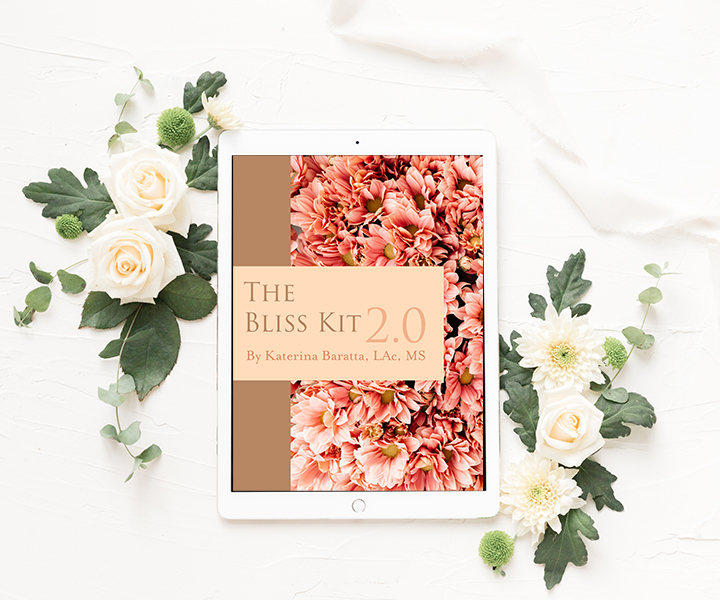How I “Turned Off” My Anxiety
The seasons are shifting, and I’m not just talking about the weather. This past month has been a wild ride for me personally, too.
I had to make a career choice that will change the trajectory of my life, and I realized that the direction I thought I wanted to go wasn’t actually what I wanted at all.
I spent hours crunching numbers, making lists, and trying to find the best solutions, and meanwhile pressure started to build in my body in a familiar way.
Now here’s where it gets interesting.
In the past with a decision this big, I would have been as anxious as prep-schooler before the SATs.
As tension around my belly and heart tightened, my mind used to flood with endless interpretations and what-if scenarios, desperately looking for a solution that would make the ever-increasing tightness go away, (hello, anxiety!)
All of that thinking would then make the feelings more intense, and my anxiety would quickly spiral from a few restless thoughts into a tornado of overwhelm.
But that’s not what happened this time.
This time I still felt the tightness in my belly and chest. My heart rate was still elevated and my mind still did flood with thoughts—for a short while.
But this time I didn’t freak out.
My body was stressed, yes.
A little stress is normal and healthy when faced with a life-changing decision!
Stress is only a problem when it becomes chronic, or so intense that it overwhelms your system, as is the case with anxiety.
But when I noticed my thoughts starting to spiral this time, I just turned them off.
It’s like I just pressed a button inside myself, and *poof!* all anxiety was gone.
Instead of being swept up in a storm of emotions, as I would’ve been in the past, I was able to let go of any thoughts that weren’t immediately useful and bring my focus back to the present moment.
How?
I was able to do this because I understand what my nervous system needs.
And because I know how to take care of my nervous system, stressful situations rarely tip me over into anxiety anymore.
Here are some of the things I do regularly throughout the week to support my nervous system, which make me better equipped to handle stressful situations when they inevitably arise:
1. Eat a gut-healthy diet
Scientific research is confirming what ancient healers have said for thousands of years: health starts in the stomach, and when digestion isn’t optimal, it has an effect on both your mind and body.
If you take care of your gut health, mental health issues like anxiety are a lot less likely to bother you. (1)
Learn more: 9 Ways to Improve Gut Health
2. Prioritize both sleep and rest
Anxiety is a response to stress, and when your basic needs aren’t met, stress is automatically heightened as your body has to work harder to keep you going.
Sleep is when the body detoxes, both physical waste as well as emotional build-up (which might explain all those weird dreams!) (2)
If you don’t give yourself enough time to get at least 8.5 hours in bed (average for most people) you don’t give your body enough time to process all of the day’s emotions and you increase the likelihood that you will feel anxious.
Learn more: How to Get More Sleep When Your Mind Won’t Shut Up
Similarly, your mind and body both need time to rest and relax while you’re awake, too.
Without taking a time-out from work and daily demands, you use up all of your energy reserves and that depletion can easily throw you over your stress-threshold.
And if you’re someone who’s susceptible to anxiety, you’re much more likely to spin into overwhelm if you don’t intentionally give yourself a break.
3. Regular outdoor exercise
For me this is walking my kids to school in the morning and jogging on a few afternoons every week, but for you it might be something different. The most important thing is to get out into nature, if you can, and break at least a small sweat.
Bonus points if you get outside before 9 a.m., because the blue light in the morning helps to regulate your hormones and improves your ability to fall asleep later at night.
4. Mindfulness, seated, and moving meditations
These are called practices for a reason. There’s no end-goal (except maybe achieving enlightenment, but most of us have our sights set on smaller wins in this lifetime).
While each of these practices has different benefits, the one thing they all have in common is that they help you find a little space between yourself and your thoughts.
Once you observe this separation between you and your thoughts, you can then practice letting go of your thoughts to bring your focus fully on the present moment, where everything is more clear.
To get to the point where you’re just able to switch off the unnecessary chatter of your mind, however, takes some guided practice.
If you’d like to learn more about integrating these practices into your everyday life, click here to check out my 14-day online embodied mindfulness course, The Practice.
5. Custom Herbal Formulas
It’s true that the supplement market has gotten a little out of control, and I still believe that food is the best medicine. But traditional medicinal herbs are another story.
Most supplements being sold today are taken on a symptom-by-symptom basis, so if you’re anemic, for example, you’ll take extra iron, or if you have arthritis you might try turmeric and black pepper.
I’ll admit that I use supplements this way too, on occasion.
But the most powerful herbal remedies don’t just target single symptoms. Instead, they are formulated to address the underlying root cause of what’s going on with you, and only a skilled herbalist knows how to do that.
Learn more: Schedule an online coaching session with Katerina to get your own herbal formula
5. Acupuncture and bodywork
Acupuncture and bodywork don’t just give you an indulgent time-out from your hectic life (though they can be great for that, too!)
Like herbal formulas designed by a skilled practitioner, acupuncture and bodywork can help to regulate the nervous system and improve hormone flow so you have an increased capacity to handle stress (ie have less anxiety,) and are better able to show up for life the way you want to.
Monthly visits are great for prevention, maintenance, and rejuvenation, whereas weekly visits are preferable when symptoms flare or during times of transition.
Learn more: How many acupuncture sessions do you need before you feel better?
And in moments of intense stress like the one I just went though—and this is crucial for relieving anxiety—it’s indispensably important to let your body sob and shake it out.
Once I had made my decision known, it felt like I had stepped out of a fog and could now see out to the horizon of a glittering ocean.
But the stress that had accumulated in me over the past weeks still needed to be released from my body.
I had to give my body the opportunity to process out what I had just been through so it could move out of my system and I could move on.
If that kind of pressure lingers in your body for too long, that’s when the mind kicks into anxiety overdrive, trying to find the pressure-release valve.
But the pressure from pent-up stress is only released through physical ex-pression, literally, pressing out the feelings, which usually means crying and/or letting your body move.
The secret to feeling better and not feeling anxious is to tune into what your body needs, and allowing it to express those feelings without mental interpretation getting in the way.
Once I let myself cry and let my body shake, I felt the pressure let up.
It’s like sheets of constrictive armor just shed off me.
At no point in this process did I feel anxious, because I freely allowed my body to do its thing, and anxiety only happens when we fight against the experience we’re having.
You, too, can press the off-button on anxiety anytime you want, but you have to learn to redirect your focus on the present moment and honor what your body is telling you.
This can mean different things for different people at different times in life.
If you’d like some support in learning to decode your body’s language, I’d love to help.
All uncomfortable symptoms—including anxiety, but also physical symptoms like digestive issues, insomnia, and menstrual pain—are signs that something is off balance.
But many people I work with find that just a few small changes can redirect the whole mind-body system down a healthier, freer, more fruitful path.
Let’s do this together.
If you’re in the Portland, Oregon metro-area, call today to schedule a session with me for acupuncture and bodywork, and let’s create a treatment plan to bring you back into alignment.
And if you’re outside of Oregon or if you want more guidance, click here to book an online holistic health coaching session so you can learn how to support your own nervous system, balance your hormones, and push the “off” button on anxiety more easily when you need to.
I can’t wait to see where this takes you!
Warmly,
Katerina
References:
2. Sleep and Processing of Emotions




